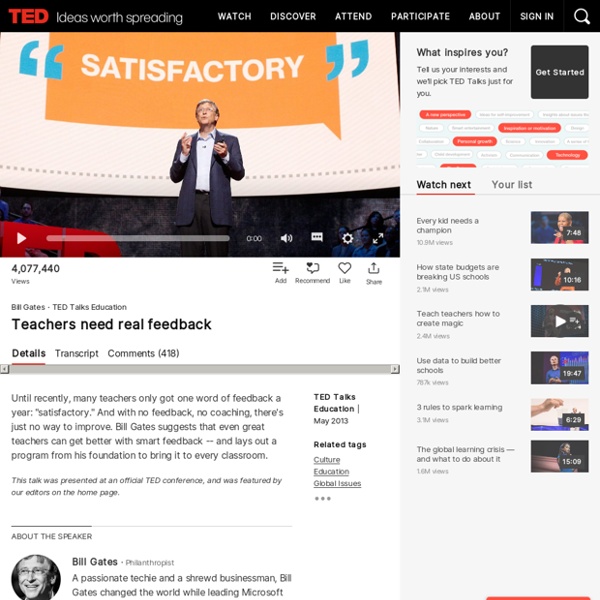



https://www.ted.com/talks/bill_gates_teachers_need_real_feedback
Related: ReflectionSelf Reflection: An important aspect of IB Curriculum - IB Speak Self reflection is a tool which helps in self assessment and bring positive changes in one’s personality. To be a self reflector, the technique of reflection needs to be incorporated in a person from the childhood. Small reflections at every stage and on every piece of work develops meta cognitive skills and enhances the experience of learning journey. When students reflect on the learning they make informed choices and decisions.
The Art of Reflection A few weeks ago, I met with a group of educators to discuss their observations from a series of learning walks in classrooms. They found that though students could accurately tell them what they were doing, they struggled to articulate what they might be learning. In response, I suggested building reflection into the daily routine. Whether students use audio and video or pen and paper, encouraging them to take a few minutes to capture not only what they learned, but also how and why, may ultimately allow them to make deeper connections to the content. The Reflective Student: A Taxonomy of Reflection (Part 2) – Copy / Paste by Peter Pappas reflective student Reflection can be a challenging endeavor. It’s not something that’s fostered in school – typically someone else tells you how you’re doing! At best, students can narrate what they did, but have trouble thinking abstractly about their learning – patterns, connections and progress.
23 Maker Learning Reflection Questions For Thoughtful Students 23 Maker Learning Reflection Questions For Thoughtful Students by Dr. Jackie Gerstein & TeachThought Staff Grow with TeachThought PD Maker Ed Workshops. An underappreciated part of the planning process is the idea of reflection. EfratFurst - Meaning First Making meaning in explicit ways is crucial yet insufficient. Effective practice is essential to make the concept accessible and useful. Thanks to cognitive research we know a lot about designing effective practice. When it comes to semantic knowledge, effortful and deliberate retrieval practice that is adequately repeated, varied and distributed is highly beneficial for long-term learning7. And yet, an important question would be: WHY are these factors important and what we should focus on when designing practice activities?
THINKING PATHWAYS - Home Julia Galef: Why you think you're right BBC Radio 4 - The Educators, Sir Ken Robinson